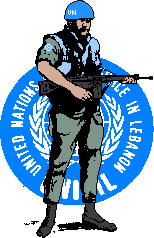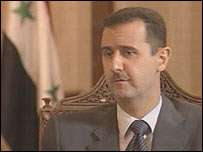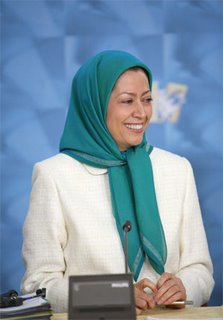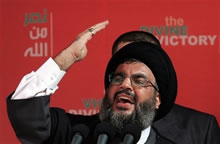THE CALIPH-STROPHIC DEBATE By Walid Phares

THE CALIPH-STROPHIC DEBATE
By Walid Phares
Published by George Mason University's History News Network HNN.
It seems that the US is having a hard time winning the hearts and minds of Arabs and Muslims, but an equally serious problem can be observed in the intellectual circles of America where some have had a difficulty coming to terms with the terminology of the War of Ideas. If the educated elite of the United States is incapable of identifying the ideology and the strategy of the Jihadists five years after 9/11, we not only have a problem with handling the War in Iraq, but also with the future of American national security as a whole.
An article published in Newsweek magazine on October 13, 2006 illustrates this problem. Entitled “Caliwho?” it asks why President Bush has raised the issue of an Islamic Caliphate. Lisa Miller and Matthew Philips, co-authors of the piece, begin by defining the term, “Caliphate” as a “fifty-cent word” posing a question of why a U.S President would use it four times in one speech. At first read, I thought the Newsweek journalists were lamenting the delay with which the chief executive of the nation has finally begun using this term - half a decade after September 11, and fifteen years after the collapse of the Soviet Union. After all, has not the American public demanded that the US Administration and Congress take steps toward “informing” the nation about the enemy, its ideology, and its future goals? Since one of the most important objectives of al Qaeda, the Taliban, and the Salafi Jihadi networks around the world has been the re-establishment of a Caliphate - incorporating in it all Arab and Muslim states – one can only express relief that the term “Caliphate” has finally entered the President’s speeches.
However, as I continued to read further, I realized that the authors of the Newsweek article were putting forth quite a different view. They seemed to be appalled by the fact that the President “dared” to mention the “word” Caliphate and spoke of the Jihadists’ attempt to “extend the Caliphate, establish the Caliphate and spread the Caliphate.” Miller and Philips, writing with the certitude of Middle East Studies expertise, reminded their readers, oddly, that “many people (in the US) live long without using the word Caliphate” suggesting the uselessness of the President’s vocabulary.
Precisely this absence of understanding of the term Caliphate was the problem in the 1990s. During that decade, most instructors in American classrooms unfortunately succeeded at “dis-educating” the nation about the nature of the enemy by simply leaving out the term “Caliphate” of the curricula for Middle East Studies classes. If American students, many of whom would end up being recruited to newsrooms, have never heard about the Caliphate, Salafism, Wahabism or Khomeinism - let alone Jihadism – then the US was inevitably headed for a big trouble.
If in 1941, one would not know what “Reich” meant in the Nazi rhetoric, one would not be blaming those who would be helping others to understand it, but rather those who concealed the meaning from others in the years prior to the rise of Hitler. Since it has turned out that Americans were not properly educated by their Middle East Studies experts prior to 9/11, it is these academic and intellectual elites that should be put on the spot and questioned about their motivation to massage – for decades - Islamic history to make it more palatable to Western audiences. Why are the Newsweek authors blaming US government officials for taking up the task of teaching the nation about the true nature of the enemy when those charged with the task have obviously failed to do so?
Authors Miller and Philips continue further in misleading their readers. They blame the President for using a “pejorative” tone when referring to the “Caliphate” suggesting that the term is quasi-sacred and should be used with near-reverence. The authors treat the term as if it denoted a mere historical period and not an aggressive political project of the Jihadists of the 21st century. The term “Caliphate”, with all its linguistic and doctrinal derivatives in today’s Salafi terminology, is as charged and politicized as the “Third Reich” was to the National-Socialists during WWII. The “Caliphate” epitomizes all that the Jihadists are preparing for, working towards, and killing for. This word IS at the center of the War with Terrorism – it is not an obscure academic word as Miller and Philips would have us believe. The bringing back of the “Caliphate” is the chief reason why Osama Bin Laden, Ayman Zawahiri, Zarqawi, and Adam Gadahn have declared and waged a war against the people of the United States. Given its centrality to the Jihadist activities, the term must be treated seriously.
But Newsweek ’s investigative team is more interested in the “political” implications of such a use. Maybe it could stir some trouble overseas as the alleged Guantanamo-Koran affair did before? Or perhaps it would mobilize another campaign by the traditional (Wahabi funded) elites against educating Americans on matters “they shouldn’t know more about?” Who knows?
The article attempts to “link dots” between the use of the term “Caliphate,” and the so-called abhorred use of the terms “axis of evil,” Islamo-fascism, Islamic radicalism, militant jihadism, or what they coined as the “too jargony but more scholarly term of Islamism.” While they weren’t technically wrong on the latter, the authors implied the President is perhaps wrong or “political” when he used the more focused ones. Miller and Philips interestingly target the “people who prep him,” i.e. his speech writers, as perhaps pushing “complicating” words into the mouth of the commander in chief: in other words his advisors who probably encourage him to draw the attention of the American citizens to what the “Islamists” are up to. So, in sum, the article would suggest calling the enemy “Islamists” (the academic term) but not revealing their objectives, one of which is to establish a Caliphate. Is the Newsweek article calling on US leaders, President or congressional leaders “not” to use the term Caliphate at all, so that readers and the public at large “wouldn’t” learn what the actual Islamists “want” to do? This would be a disservice to the public and in total contradiction with the noble mission of the press.
But the matter would sound even more dramatic to Jihadism experts: For the article says “no one but students of Islamic history have much more than a vague idea of what it means.” Well, if we count on the educational system that “taught” America in the 1990s, you’d end up believing that Jihad is “spiritual yoga,” that Takfir is some Rock’n Roll Band, and that Umma is a Hollywood actress. Sure, if you count on our mostly Wahabi- funded Middle East studies programs you will get your Caliwhos and even your Caliwhats. Neither the US Congress nor the White House, let alone Homeland Security, are paid to teach students; campuses are, and handsomely. Unfortunately they did a bad job in educating their pupils, and now they are putting the blame on the graduated students.
You didn’t have to be an expert on German history or philosophy in 1940 to know what a Reich is. Nor did you have to be a specialist in Roman History and Latin to understand what fascism was. If today’s Joe and Jane Doe aren’t familiar with the term Caliphate it is because “someone” didn’t help them to make the acquaintance and that another someone is still obstructing that knowledge by alleging that this is only for the high cast of academics. While tens of thousands of Jihadists are pledging to the Caliphate before they commit to suicide bombings, beheadings and wrecking havoc in civil societies around the world, some voices (not necessarily the authors of the articles but intellectuals who are offended by popular awareness) are complaining about even “raising the issue.”
Although finding that students in Islamic studies can barely understand the Caliphate, the article yet uses a Merriam-Webster’s “dictionary” to educate readers:
A caliphate, according to Merriam-Webster’s dictionary, is the “office or dominion of a caliph”; a caliph is “a successor of Muhammad ... [the] spiritual head of Islam.”
Well, in Islam there is no such a thing as the spiritual head of Islam. One wonders how did Webster's come up with this “spiritual head of” concept other than projecting a Christian-centric concept? Prophet Mohammed, according to the Islamic faith is the last Prophet and the messenger of Allah. He didn’t organize the Caliphate before he died. His followers established this system of succession, which with time, became the head of the Islamic state, not an office for spiritual affairs. Even though the Caliphs were technically the successors to the Prophet at the head of the community, known as Umma, they were heads of Government, leviers of taxes, managers of prosperity, ultimate judges, and more importantly commanders in chief of imperial armies. Caliphs invaded countries and involved themselves in civil wars among Muslims. Dozens of Caliphs were killed in coup d’etats, putsches, battlefields, succession wars, etc. The Caliphate wasn’t just an office to interpret holy texts but it was also a real Governance and power position; the equivalent to the Papacy and Emperor rolled into one. Trivializing the institution of the Islamic Caliphate for 14 centuries just to score points against a sitting President for eight years in "infidel" America is absurd.
Then Miller and Philips go on to lecture on the Caliphate-101:
After the Prophet Muhammad died in 632 A.D., his father-in-law, Abu Bakr, became the first caliph. (At the heart of the schism between Sunni and Shia Muslims, even today, is the question of succession: who has the right to become Islam’s caliph?) From the time of the Prophet’s death until the Mongols sacked Baghdad in 1258, caliphs ruled over Muslims and presided over the Muslim expansion throughout the Middle East, Asia, Africa and Europe. These were the caliphates; some beneficent, some warmongering, in concept not unlike any other empire or dynasty.
So, the lesson from Newsweek article is that indeed the Caliphs were emperors and did wage wars. Some were benign, others harsh, as in any other empire. But that is important for average Americans to know and for Europeans to remember: Caliphs were involved in geopolitics and have declared Jihads, as did Christian emperors for centuries, on divine inspiration. Hence, Caliphs aren’t spared criticism and aren’t shielded from historical analysis and judgment because they were strictly spiritual. Besides, even if they were, Caliphs aren’t deities and the Caliphate is a very earthly thing. Along with all other offices of power in world history, the Caliphates had blood on their hands and no one can dispute that.
But what was missed by the writers was that the US President, and before him President Putin, US Congressional leaders from both parties and Arab clairvoyant leaders such as King Abdallah of Jordan and others, when they mention the Caliphate as a threatening goal, they are not playing historians. They are not talking about Caliphs Omar, Moawiya, Haroun el Rashid or Sleiman the Magnificent. Those are the Caliphs of history, not the commanders of 21st century al Qaeda. Adolph Hitler wasn’t a German emperor from the Middle Ages but he pretended he was their heir. Mussolini wasn’t Julius Cesar but he played his role. Hence when world leaders are warning about the “Caliphate” they aren’t arguing with those who died centuries ago, but resisting the extremists who want to reawaken the dark ages again, but with modern weaponry.
The article imputes rightly to Usama Bin laden the many troubling statements about “his” caliphate:
“Baghdad, the seat of the caliphate, will not fall to you, God willing,” he said, “and we will fight you as long as we carry our guns.” Bin Laden’s rhetoric evoked, as it often does, an earlier, golden era of Islam, one that exists more in his imagination than in the lawless, crumbling city of Baghdad today.”
Precisely, as I explain in my book Future Jihad, the Salafi Jihadists live in the past, borrow from the past but their bloody projects are in the present and loom over the future. When leaders, because of the mishaps of academics, respond to al Qaeda, they are sending a firm message: “This” Caliphate, which is against international law and the enemy of Muslim moderates as well, won’t be allowed to crush the international community and democracies. But our media unfortunately are not interested in a smart and vigorous response to the terrorists, but only in what can be harvested domestically in partisan “debates.” This article is telling us that Bush (or the 1990s’ Clinton for that matter) or any future President shouldn’t utter the word Caliphate, even if it has been absorbed by the modern days Jihadists and used in their mobilization campaign. As if in 1941, American Presidents would have been criticized for the use of “Third Reich” because “many centuries ago, the Reich was perceived as the German nation re-gathered.” Puzzling, isn’t it?
But the academic inquiry turns quickly into the usual political thing. They write: “Backers of the war in Iraq—Vice President Dick Cheney and Defense Secretary Donald Rumsfeld, not to mention hawks like Sen. Rick Santorum of Pennsylvania—jumped on the word and used it in speeches dozens of times.” It is sad to see a debate about a national security, war on terror, war of ideas, history and ideology, rushed into “backers of wars, hawks, jump on word,” litany. For the Caliphate debate isn’t about Republicans and Democrats but about the victory of democracy and the survival of the Republic. It is not a partisan thing but a national defense and world security matter.
And to top it the article consults with the Islamist lobby on the issue and elevate it to the position of ex cathedra on all things Islamic. They write:
Parvez Ahmed, chairman of the Council on American Islamic Relations, says bin Laden’s word choices distort Islam for the world, and he wishes the president would take more care. When Ahmed heard “caliphate” Wednesday morning, he thought of the way Bush used the word “crusade” after September 11. “There’s a fundamental misunderstanding with the president and his advisers on core Islamic issues,” Ahmed said. “He’s getting bad advice, they’re misinformed on Islamic terminology.” Either that, or he’s making a strategic rhetorical choice.
With all due respect to the opinions and analysis of the spokesperson quoted, the question is not who has the real interpretation of the caliphate or Jihad for that matter. CAIR and al Qaeda could debate these matters at will, and one would wish to see this debate happening soon. I mean a real and open debate between the American Islamist-based group on the one hand and Adam Gadahn or Zawahiri on al Jazeera. That would be very informative, but obviously it is technically difficult since Gadahn is indicted and Zawahiri is wanted for justice, both for terror. Nevertheless it would be more academically sound to interview some pro Bin Laden Salafi Jihadi clerics on what the Caliphate they are struggling for IS, and IS slated to become when the time comes, and compare what they are saying with what Western leaders are talking about. Apples shouldn’t be mixed up with Oranges in the War of Ideas.
Tony Blair, the enemy number two of the Jihadi-terrorists after Bush, said a few weeks ago that, yes, we need a war of ideas: a campaign of intellect inside Western democracies, so that the public can be made aware of the realities of the War on Terror. He made a great point. For the Caliphate debate shows more clearly than anything, how “Caliph-strophic” the discourse is among our dominant intellectual elites.
This article was also published by World Defense Review, Family Security Matters and posted on FDD's web site.
Dr. Walid Phares is a Senior Fellow with the Foundation for the Defense of Democracies, a Visiting Fellow with the European Foundation for Democracy and the author of “Future Jihad: Terrorist Strategies against America.” Email: Phares@walidphares.com









